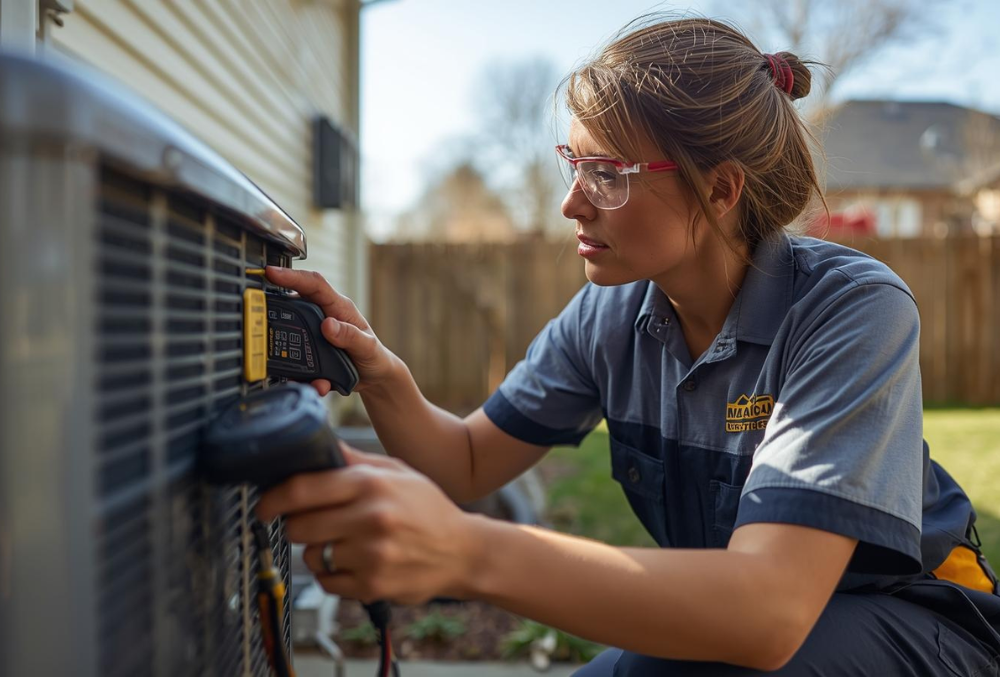An HVAC inspection from Leaps & Bounds in Camp Hill, PA, is more than a seasonal appointment. It is a smart investment that safeguards your home’s comfort, helps control energy costs, and keeps your heating and cooling systems running reliably year-round. This service identifies potential issues early, maximizes efficiency, and ensures every component is performing as it should.
By partnering with a trusted local team, you gain peace of mind knowing your system is ready for the demands of changing weather. This guide covers what to expect from a local HVAC inspection, the benefits for your home, how to prepare, and the steps to take once you receive your results.

Why a Local HVAC Inspection Matters
Camp Hill’s climate changes quickly, from chilly winters to humid summers. A dependable HVAC system is essential, and regular inspections help you avoid costly surprises.
With over two decades of experience, the Leaps & Bounds team knows how to:
-
Catch small issues before they cause breakdowns.
-
Keep systems running at peak efficiency.
-
Improve indoor air quality.
-
Extend the lifespan of your investment.
Regular inspections can also lower utility bills by ensuring your equipment runs at its most efficient settings.
What Happens During an HVAC Inspection
Every home’s system is unique. Whether you have a gas furnace, heat pump, mini split, or boiler, inspections include a combination of visual checks, performance testing, and safety verification.
Typical inspection steps include:
-
Examining the heat exchanger for cracks or damage.
-
Checking ignition systems, burners, and flame sensors.
-
Inspecting refrigerant levels and detecting leaks.
-
Cleaning coils, air handlers, and filters.
-
Verifying thermostat accuracy and settings.
-
Assessing ductwork or venting for blockages or corrosion.
-
Reviewing electrical connections and lubrication points.
-
Confirming safety controls are operating as intended.
This process ensures your system is safe, efficient, and ready for the demands of the next season.
Gas Furnace Checklist
For homes with gas furnaces, the inspection often includes:
-
Heat exchanger inspection for cracks, which can indicate safety hazards.
-
Burner assembly testing and cleaning to ensure efficient ignition.
-
Flue and vent system review for obstructions or corrosion that could affect airflow.
-
Safety control function check to verify reliable shutoff in emergencies.
-
Air filter cleaning or replacement to maintain healthy indoor air quality.
These steps help your furnace operate safely, reduce energy waste, and extend equipment life through Camp Hill’s colder months.
Heat Pump Checklist
For heat pumps, technicians will:
-
Verify refrigerant charge and inspect for leaks that can reduce efficiency.
-
Check coil cleanliness and condition to maintain proper heat transfer.
-
Test reversing valves for accurate seasonal switching between heating and cooling.
-
Inspect electrical connections for safety and performance.
-
Lubricate moving components to prevent wear and noise.
These steps ensure your heat pump operates efficiently, delivers consistent comfort in all seasons, and avoids unnecessary strain on the system.
Ductless Mini Split Checklist
A ductless system requires:
-
Air handler and outdoor unit cleaning to maintain airflow and prevent dust buildup.
-
Sensor and control testing to ensure accurate temperature readings and system response.
-
Communication checks between indoor and outdoor units for smooth operation.
These steps help your mini split deliver quiet, efficient heating and cooling while preventing performance issues that can arise from dirt, miscalibration, or signal errors. Regular inspection also supports energy savings and prolongs the lifespan of the equipment.
How to Prepare for Your HVAC Inspection
Preparation allows technicians to work efficiently and identify issues faster.
Before your appointment:
-
Clear space around indoor and outdoor units.
-
Note any unusual noises, odors, or performance problems.
-
Gather previous maintenance records.
-
Secure pets and keep children away from work areas.
-
Turn off the system one hour before the appointment.
After the Inspection: Understanding Your Report
Your inspection ends with a written report outlining:
-
Current condition of each system component.
-
Recommended repairs or adjustments.
-
Efficiency or safety concerns.
Take time to review the report with your technician and ask questions about anything unclear. Promptly addressing small repairs, like a worn belt or dirty coil, can prevent future emergencies.
Maintenance Plans and Next Steps
Following your inspection, you may:
-
Schedule necessary repairs.
-
Sign up for a preventive maintenance plan.
-
Plan for efficiency upgrades
Leaps & Bounds offers ongoing maintenance programs that keep systems running smoothly year-round and help you plan ahead for replacements.
What to Expect from an HVAC Inspection
A professional HVAC inspection is a simple yet valuable step in keeping your system efficient and reliable. Most visits take between one and two hours, depending on your system’s size and complexity. During this time, a trained technician will check every component for performance, safety, and signs of wear.
Inspections are best scheduled at least once a year, ideally in the spring or fall, so your heating and cooling equipment is ready for the seasons of heavy use. In some cases, parts may need replacement if they are worn or damaged, but you’ll always be informed and given approval before any work begins.
Regular inspections not only help prevent sudden breakdowns, but they also improve efficiency. A well-maintained system uses less energy, which can lower your utility bills and extend the lifespan of your equipment.
Schedule Your Local HVAC Inspection Today
Protect your home comfort, improve energy efficiency, and avoid unexpected breakdowns with a professional HVAC inspection from Leaps & Bounds.
Call our friendly team today or request service through our website to secure your appointment.


